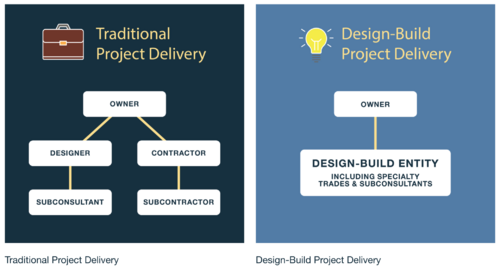Design-Build
(→Abstract) |
|||
| Line 21: | Line 21: | ||
== Big Idea == | == Big Idea == | ||
| − | === | + | === Choosing the right project delivery method === |
| + | |||
| + | https://dbia.org/wp-content/uploads/2018/05/Primers-Choosing-Delivery-Method.pdf | ||
=== Why choose Design-Build === | === Why choose Design-Build === | ||
| + | |||
https://www.pmi.org/learning/library/selecting-best-project-delivery-system-8910 | https://www.pmi.org/learning/library/selecting-best-project-delivery-system-8910 | ||
Revision as of 10:44, 15 February 2021
WIP
Developed by William Axel Linderoth Michaelen, s153275
Contents |
Abstract
Design-Build is a project delivery system, mainly used in the construction industry. The method utilizes single source responsibility which differs from the more traditional dual or triple source responsibility format used in Design-Bid-Build. The responsibility is defined by contracts, where the contract in the Design-Build project binds the architect and the contractor under one contract with the project owner. One of the key reasons for doing so is to create a shared responsibility between the architect and the contractor, and thereby involve the architect in the construction phase, and the contractor in the design phase.
Design-Build projects can be further divided into two types; Architect-led Design-Build projects and Contractor-led Design-Build projects. In these cases the Design-Build entity is led either by the architect or the contractor, which affect the management structure and responsibilities in several ways with different pros and cons.
A project delivery system such as Design-Build is essential to project management in construction projects, and especially ties into project procurement management, where a clear definition of the project delivery method is needed. The defining of a project delivery method is a critical deliverable of the procurement strategy as it is defined in the PMI standards for project management. The procurement strategy should define a project delivery method, the contract payment types, and the procurement phases.
Design-Build as delivery method in construction projects is most suitable when:
- Early on site construction is needed, making design and construction phases overlap
- The client wishes to minimise their risk – no responsibility for design
- The project is technically complex and can benefit from the contractor’s expertise
- Where the owner does not want to retain full control over the design development
https://www.designingbuildings.co.uk/wiki/Design_and_build_procurement_route
Big Idea
Choosing the right project delivery method
https://dbia.org/wp-content/uploads/2018/05/Primers-Choosing-Delivery-Method.pdf
Why choose Design-Build
https://www.pmi.org/learning/library/selecting-best-project-delivery-system-8910
Pros:
- One liable party: Text
- Efficiency: Text
- Collaboration: Text
- Project costs: Text
- Fewer disputes: Text
- Direct payment: Text
Cons:
- Conflicts of interest: Text
- Less innovative design: Text
- Requires more engagement from the owner: Text
- No bidding restricts access for subs: Text
- Increased liability: Text
Management Structures
https://www.levelset.com/blog/design-build/
Contract
https://www.consensusdocs.org/contract_category/designbuild/
Figure / Picture
Limitations
Annotated Bibliography
Book title Descriptive text
